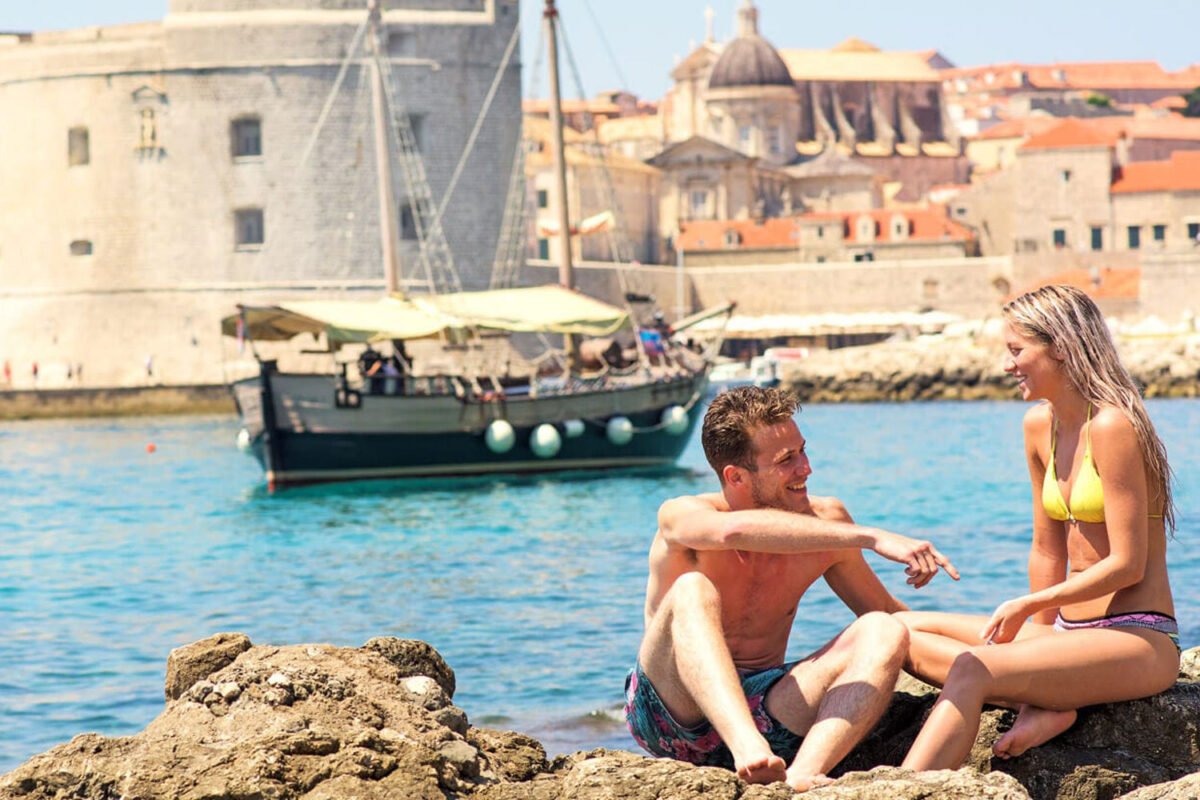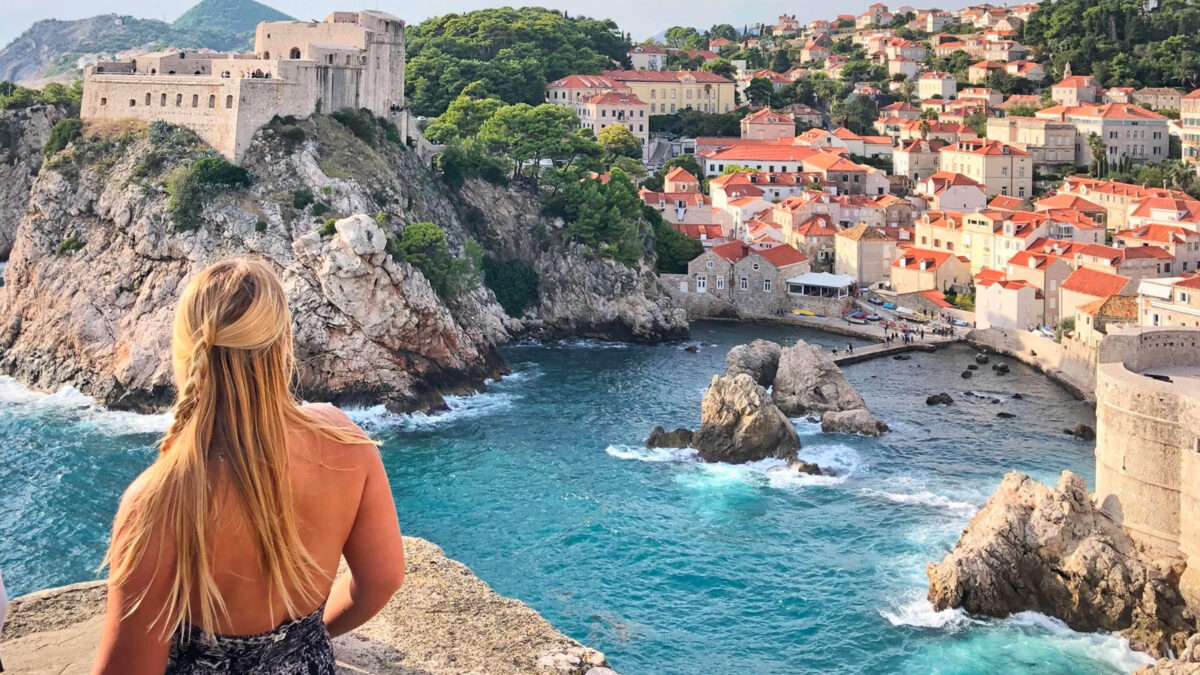Russia has invaded Ukraine. This has prompted the likes of UK Minister James Heappey to say Europe is now closer to war than at any point in the last 70 years. While Putin earlier this week brought troops in under the guise of “peacekeeping,” Russian forces are now launching missiles at Kyiv, the city of Kharkiv and through central and eastern parts of the nation.
Russia has also captured Chernobyl – the site of the 1986 nuclear disaster – in what has been described as “one of the most serious threats in Europe today.”
Some experts fear Russia plans to overthrow the Ukrainian government and replace it with a puppet regime loyal to the Kremlin.
There is a lot more at stake here than Australians’ European holidays. In fact, that’s probably the last thing on the list of What Matters Here. If you want to read about geopolitics or the human element of the tragedy currently occurring, however, head over to Reuters or The New York Times.
If you’re feeling selfish, however (or if you simply want to educate yourself about how the situation might affect your travel plans for this year), here’s how Russia’s Ukraine invasion could impact Australians travelling to Europe in 2022.
Table of contents
- Travel To Ukraine
- Travel To Russia
- Travel To Countries Sharing A Border With Ukraine
- What Does The Ukraine Invasion Mean For Travel To The Rest Of Europe?
- Could The Russia-Ukraine Conflict Spread To Other Countries?
- Are Travellers Cancelling Their Trips To Europe?
- What Might Happen Next (In Terms Of Travel To Europe)?
- Will My Flight To Europe Travel Over Ukraine?
- What Should I Do If I’m Planning A Trip To Europe?
- How Will The Russian Invasion Of Ukraine Impact Travel Insurance Of Australians Travelling To Europe?
- How Long Will Travel Be Affected For?
Travel To Ukraine
Smartraveller, the official website which advises Australians on how to travel safely, currently advises Australians not to travel to Ukraine. It states: “Military action is underway in Ukraine. There have been reports of explosions in Kyiv and other parts of the country. There are reports of Russian troops entering Ukrainian territory including in Odessa. If you’re in Ukraine, shelter in place until you judge it’s safe to depart.”
“Seek shelter in a hardened structure away from windows. Review your personal security plans. Be alert and aware of your surroundings. Continue to monitor advice on Smartraveller and reputable local and international media. The security situation is volatile and deteriorating.”
“Where it is safe to do so, you should leave Ukraine.”
Smartraveller
Travel To Russia
Australians are being advised to reconsider their need to travel to Russia.
Travel To Countries Sharing A Border With Ukraine
Smartraveller advises a “high degree of caution” for travel to Moldova due to the impacts of COVID-19. It has also been updated to reflect the invasion of Ukraine.
Its advice for Moldova reads: “Military action is underway in Ukraine. There have been reports of explosions in Kyiv and other parts of the country. You should not attempt to cross into Ukraine from Moldova. You should follow the instructions of the local authorities at all times. If you have arrived in Moldova from Ukraine and are in need of assistance, contact the Consular Emergency Centre on 1300 555 135 in Australia or +61 2 6261 3305 outside Australia.”
Smartraveller also advises you do not travel to Transnistria (Transnistria, officially the Pridnestrovian Moldavian Republic, is an unrecognised breakaway state located in the narrow strip of land between the river Dniester and the Moldovan–Ukrainian border that is internationally recognised as part of Moldova due to the fragile security situation).
Smartraveller recommends travellers exercise a “high degree of caution” for travel to Romania, Poland, Slovakia and Hungary, warning travellers of the nearby conflict and COVID, and warning them not to cross the border into Ukraine.
Belarus, which is closer to the conflict, has a “do not travel” warning. Smartraveller reads: “Military action is underway in Ukraine. There have been reports of explosions in Kyiv and other parts of the country. You should not attempt to cross into Ukraine from Belarus. If you’re in need of assistance, contact the Consular Emergency Centre on 1300 555 135 in Australia or +61 2 6261 3305 outside Australia.”
“We advise do not travel to Belarus due to the volatile security situation caused by the Russian military build up along Belarus’ border with Ukraine and risk of armed conflict. If you’re in Belarus, you should consider leaving by commercial or private means if it’s safe to do so.”
“We continue to advise you do not travel to the Belarus-Ukraine border due to the risk of armed conflict. Be aware that there are joint military exercises underway between Belarus and Russia on Belarus’ western and southern borders (see ‘Safety’). We continue to advise you do not travel to areas near borders with Latvia, Lithuania and Poland due to ongoing civil unrest” (Smartraveller).
What Does The Ukraine Invasion Mean For Travel To The Rest Of Europe?

At the time of writing, there is no Smartraveller “do not travel” warning for Australians thinking of travelling to most of the rest of Europe. Many countries have an “exercise a high degree of caution” warning, but this is due to COVID-19, not the Russian invasion of Ukraine.
Spain, France, Greece, England, Italy, Germany, Croatia and Switzerland have “exercise a high degree of caution” warnings, due to “the impacts of COVID-19,” at the time of writing.
Serbia has a “reconsider your need to travel” warning due to the impacts of COVID-19.
Canstar reports that commercial flights have stopped flying over Ukraine: “While the situation is rapidly evolving, as of earlier this week, a number of commercial airlines had already cancelled flights to and from Ukraine.”
“Dutch carrier KLM was the first to suspend flights to and from Ukraine, and they have since been joined by airlines including Lufthansa, Air France and Scandinavian Airlines,” Canstar reports.
“Major insurance companies have indicated that they will not insure flights travelling in Ukrainian airspace. In response to this, Ukraine International Airlines said last week that it would continue flights with the help of a financial support package from the government, but at the time of writing, it is unclear if flights are continuing” (Canstar).
Could The Russia-Ukraine Conflict Spread To Other Countries?
Newsobserver.com reports: “Whether a larger war happens would depend partly on Russian President Vladimir Putin’s ambitions, partly on the West’s military response and partly on plain luck.” In other words: we don’t know.
Are Travellers Cancelling Their Trips To Europe?
Florida-based travel adviser Gwen Kozlowski told CNN Travel on February 24 via email that her agency has had questions from travelers with upcoming trips to Poland, but no cancellations so far: “We have guests traveling at the end of March and into April in Poland, but that’s over a month out. It’s impossible to say now how this will evolve. We’re basically in wait-and-see mode.”
What Might Happen Next (In Terms Of Travel To Europe)?
Kozlowski put it well: we’re in wait and see mode. More broadly, as The New York Times reports, “Europe faces a new refugee crisis, and harsh economic penalties to punish Russia are expected to reverberate worldwide.”
Will My Flight To Europe Travel Over Ukraine?
According to CNN Travel: “If you are flying on a route that would usually cross currently blocked-off airspace, the airline will reroute the flight.”
What Should I Do If I’m Planning A Trip To Europe?
Australians are currently advised not to travel to Ukraine or Belarus, and to reconsider their need to travel to Russia. As for the rest of Europe, we’ll just have to wait and see how the situation plays out.
How Will The Russian Invasion Of Ukraine Impact Travel Insurance Of Australians Travelling To Europe?
For nations with a Smartraveller “exercise a high degree of caution” warning, Australians are advised to research and take extra precautions before travelling.
You are also advised to check entry requirements for the countries you are visiting, and check the terms of any travel insurance policies and coverage you purchase, particularly regarding disruption to travel or a change in travel advice.
For nations with a “reconsider your need to travel’ warning, the Australian Government warns that there are potentially life-threatening risks, which can make the destination unsuitable for most travellers.
Anyone intending to travel to these regions is advised to check their travel insurance policies carefully because they might not cover travel to a “reconsider your need to travel” destination.
For nations with a “do not travel” advisory, the Smartraveller says that the safety of travellers is at extreme risk.
The Australian Government recommends Australians in these locations should consider leaving if it’s safe to do so.
Anyone who does need to travel to these “do not travel” places is told to get professional security advice and warned that travel insurance could easily be void for these destinations, and the Australian Government may not be able to provide support. Generally speaking, most travel insurance policies exclude claims as a result of war.
How Long Will Travel Be Affected For?
CNN Travel reports: “The situation in Ukraine is fast-moving. It is unclear how long airspace over Ukraine, Moldova, Belarus or Russia will be impacted. According to the UK government’s travel advisory, restrictions on domestic flights in Russia are currently set to be in place through March 2.”
Read Next
